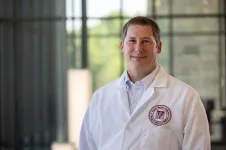(Press-News.org) Scientists have completed a deep analysis of the proteins driving cancer across multiple tumor types, information that can’t be assessed by genome sequencing alone. Understanding how proteins operate in cancer cells raises the prospect of new therapies that block key proteins that drive cancer growth, or therapies that trigger immune responses to abnormal proteins created by cancer cells.
Led by Washington University School of Medicine in St. Louis, the Broad Institute of MIT and Harvard, Brigham Young University and other institutions around the world, the Clinical Proteomic Tumor Analysis Consortium investigates key proteins driving cancer and how they’re regulated.
The findings are published Aug. 14 in a set of papers in the journals Cell and Cancer Cell.
The Clinical Proteomic Tumor Analysis Consortium is funded by the National Cancer Institute of the National Institutes of Health (NIH).
“In our efforts to develop better cancer therapies, this new analysis of the proteins driving tumor growth is the next step after cancer genome sequencing,” said senior author Li Ding, PhD, the David English Smith Distinguished Professor of Medicine at Washington University. “Through our past work sequencing the genomes of cancer cells, we identified almost 300 genes driving cancer. Now, we are studying the details of the machinery these cancer genes set in motion — the proteins and their regulatory networks that actually do the work of causing uncontrolled cell division. We are hopeful this analysis will serve as an important resource for cancer researchers seeking to develop new treatments for many tumor types.”
The researchers analyzed about 10,000 proteins involved in 10 different types of cancer. Ding emphasized the importance of the sheer volume of data in this type of analysis; many of these important cancer-driving proteins are rare in any single cancer and could not have been identified had the tumor types been studied individually. The analysis included two different types of lung cancer as well as colorectal, ovarian, kidney, head and neck, uterine, pancreatic, breast and brain cancers.
“Many of these proteins driving cancer are found in multiple tumor types but at low frequency,” said Ding, also a research member of Siteman Cancer Center at Barnes-Jewish Hospital and Washington University School of Medicine. “When we analyze many cancer types together, we increase the power we have to detect important proteins that are causing the cancer to grow and spread. A combined analysis also allows us to pinpoint the major common mechanisms driving cancers across types.”
Beyond the function of individual proteins, such data also allow the researchers to understand how proteins interact with one another to fuel cancer growth. If the levels of two proteins correlate with one another — for example, when one is present at high levels and the other always is as well — this can indicate that the two proteins act as partners. Disrupting the interaction may be a promising way to block tumor growth.
The studies, including one co-led by Ding and Gad Getz, PhD, of the Broad Institute, also revealed different ways proteins can be chemically altered to change their function. The researchers documented how such chemical changes — processes called acetylation and phosphorylation — can alter DNA repair, change immune responses, and modify how DNA is folded and packaged, among other important molecular changes that can play roles in driving cancer.
The research also shed light on the effectiveness of immunotherapies. Immunotherapies such as checkpoint inhibitors often work best in cancers with a lot of mutations, but even then, they don’t work for all patients. The researchers found that high numbers of mutations don’t always result in an abundance of abnormal proteins, which is what the immune system targets when attacking a tumor.
“For some cancers, even with mutations having the potential to generate tumor antigens, if there is no abnormal protein expressed, or very little, such mutations may not be targetable for treatment,” Ding said. “This could be an explanation for why some patients don’t respond to immunotherapy, even when it seems like they should. As such, our proteomics investigation covering the expression profiles of tumor antigens are particularly useful for designing new immunotherapy targeting selected mutations.”
In another study, Ding’s team identified patterns of DNA methylation, another chemical alteration that can influence the way genes are expressed. Such patterns can be key cancer drivers. In one important finding, the team identified a molecular switch that suppresses the immune system in certain tumor types.
The final paper in the set of four studies makes the data and analysis resources used by the consortium available to the wider research community.
“In general, this thorough proteomic and chemical modification analysis across many cancer types — combined with our longstanding knowledge of cancer genomics — provides another layer of information that we hope can help answer many ongoing questions about how cancer grows and manages to evade many of our best treatments,” she said.
Yize Li, PhD, a former doctoral student and now a postdoc in Ding’s lab, is the first author on two of the papers, one about oncogenic drivers and the other focused on data and resources. Wen-wei Liang, PhD, a former doctoral student and past postdoc in Ding’s lab, is first author on the paper focused on DNA methylation; and Yizhe Song, a current doctoral student in Ding’s lab, is a co-first author on the paper about post-translational modifications. Matthew H. Bailey, PhD, a former doctoral student in Ding’s lab, now an assistant professor at Brigham Young University, is a co-first author on the paper about oncogenic drivers.
###
The Clinical Proteomic Tumor Analysis Consortium (CPTAC) is supported by the National Cancer Institute (NCI) of the National Institutes of Health (NIH), grant numbers U24CA210955, U24CA210985, U24CA210986, U24CA210954, U24CA210967, U24CA210972, U24CA210979, U24CA210993, U01CA214114, U01CA214116, U01CA214125, U24CA210972, U24CA210979 and U24CA270823, and contract number GR0012005 (CPTAC PHASE III GENOMIC ANALYSIS). In addition, this project has been funded in part with federal funds from the NCI, NIH, under 75N91019D00024, 75N91020F00029; and HHSN261201500003I, HHSN26100064. Additional funding was provided by NIH grants R33CA263705, T32CA203690 and T32GM136542; a Leidos Biomed contract 20X042F01/TO01; and the Simmons Center for Cancer Research.
Li Y, et al. and the Clinical Proteomic Tumor Analysis Consortium. Pan-cancer proteogenomics connects oncogenic drivers to functional states. Cell. Aug. 14, 2023.
Geffen Y, et al. and the Clinical Proteomic Tumor Analysis Consortium. Pan-cancer analysis of post-translational modifications reveals shared patterns of protein regulation. Cell. Aug. 14, 2023.
Liang W, et al. and the Clinical Proteomic Tumor Analysis Consortium. Integrative multi-omic cancer profiling reveals DNA methylation patterns associated with therapeutic vulnerability and cell-of-origin. Cancer Cell. Aug. 14, 2023.
Li Y, et al. and the Clinical Proteomic Tumor Analysis Consortium. Proteogenomic data and resources for pan-cancer analysis. Cancer Cell. Aug. 14, 2023.
About Washington University School of Medicine
WashU Medicine is a global leader in academic medicine, including biomedical research, patient care and educational programs with 2,800 faculty. Its National Institutes of Health (NIH) research funding portfolio is the third largest among U.S. medical schools, has grown 52% in the last six years, and, together with institutional investment, WashU Medicine commits well over $1 billion annually to basic and clinical research innovation and training. Its faculty practice is consistently within the top five in the country, with more than 1,800 faculty physicians practicing at 65 locations and who are also the medical staffs of Barnes-Jewish and St. Louis Children’s hospitals of BJC HealthCare. WashU Medicine has a storied history in MD/PhD training, recently dedicated $100 million to scholarships and curriculum renewal for its medical students, and is home to top-notch training programs in every medical subspecialty as well as physical therapy, occupational therapy, and audiology and communications sciences.
END
Scientists reveal how proteins drive growth of multiple cancer types
Understanding of molecular basis of cancer may lead to new therapies
2023-08-14
ELSE PRESS RELEASES FROM THIS DATE:
Social determinants of health contribute to higher CVD mortality rates in Black persons
2023-08-14
Embargoed for release until 5:00 p.m. ET on Monday 14 August 2023
Annals of Internal Medicine Tip Sheet
@Annalsofim
Below please find summaries of new articles that will be published in the next issue of Annals of Internal Medicine. The summaries are not intended to substitute for the full articles as a source of information. This information is under strict embargo and by taking it into possession, media representatives are committing to the terms of the embargo not only on their own behalf, but also on behalf ...
Why are Black adults at greater risk of death from heart disease? Study blames social factors
2023-08-14
Black Americans are 54% more likely to die of cardiovascular disease than White Americans, despite a substantial overall reduction in cardiovascular disease mortality nationwide.
Now, a new study from Tulane University published in Annals of Internal Medicine has found that this racial disparity can be attributed to social factors such as unemployment, low income, and lack of a partner rather than known factors such as hypertension and obesity.
“For so many years we have focused on smoking, diet, physical ...
New research offers solutions to improve drinking water access in developing countries
2023-08-14
In 2020, 771 million people worldwide still lacked access to clean drinking water, according to UNICEF and the World Health Organization.
For this reason, many nongovernmental organizations (NGOs) prioritize building new water projects, including handpumps and small piped systems, to bring clean water to rural areas of developing countries.
Alfonso Pedraza-Martinez
New research from Alfonso Pedraza-Martinez, the Greg and Patty Fox Collegiate Professor of IT, Analytics and Operations in the University of Notre Dame’s Mendoza College of Business, examines the critical problem of drinking ...
UC study focus: faster, more accurate way to diagnose lung infections
2023-08-14
A federally funded study, led by University of Cincinnati researcher Nalinikanth Kotagiri, looks to develop a new imaging method that can identify certain types of lung infections — in real time — in order to speed up treatment for critically ill patients.
Kotagiri, an associate professor of pharmaceutical sciences at the UC James L. Winkle College of Pharmacy, has been awarded a five-year $3 million, R01 grant from the National Heart, Lung, and Blood Institute (NHLBI) to develop and study the effectiveness of different kinds of injectable probes (metallic contrast agents) that would collect at the site of the infection and immediately light up under a nuclear ...
Illinois professor describes how whaling shaped U.S. culture even after petroleum replaced it
2023-08-14
CHAMPAIGN, Ill. — The whaling industry helped drive industrialization in the 19th century, with whale oil used to light lamps and lubricate machinery. Even after petroleum replaced whale oil as an energy source in the U.S., whaling continued to be part of our cultural imagination and helped develop the idea of an energy industry, said University of Illinois Urbana-Champaign English professor Jamie L. Jones.
Her new book, “Rendered Obsolete: The Afterlife of U.S. Whaling in the Petroleum Age,” examines the influence of a dying industry during the massive energy transition from the organic fuel sources of the 19th century, including whale oil and wood, to the extraction of fossil ...
In battle against pancreatic cancer, grant-funded H-FIRE study offers hope
2023-08-14
Only about 10 percent of patients survive as long as five years after a diagnosis of pancreatic cancer.
“Pancreatic cancer is very hard to treat,” said Irving Coy Allen, professor of inflammatory diseases in the Department of Biomedical Sciences and Pathology at the Virginia-Maryland College of Veterinary Medicine. “It's one of the top five deadliest cancers in the U.S. And it's deadly because by the time you find out that you have a tumor, it's usually metastasized. You can usually treat the local tumor, but how do you treat the metastatic lesions?”
The National Institutes of Health has awarded $2.6 million to a Virginia Tech team ...
Consumers who buy cannabis products containing HHCs could be getting less than they hoped for
2023-08-14
Key takeaways
In the fast-growing marketplace for recreational marijuana and related products, products containing cannabinoids called HHCs are gaining popularity.
The neurological and physiological effects of HHCs are not well understood.
A new study by UCLA chemists is the first to explain how well HHCs bind to receptors in the human body; the scientists also devised a safer way to produce HHCs than the current standard process.
As more of the nation has adopted legal marijuana, a glut of products has emerged in dispensaries that contain the psychoactive ingredient in marijuana, ...
A new way to evaluate the impact of medical research
2023-08-14
Scientific journals and research papers are evaluated by a metric known as their “impact factor,” which is based on how many times a given paper is cited by other papers. However, a new study from MIT and other institutions suggests that this measure does not accurately capture the impact of medical papers on health outcomes for all patients, particularly those in low- or middle-income countries.
To more fully capture a paper’s impact on health, metrics should take into account the demographics of the researchers who performed the ...
Department of Energy announces $112 million for research on computational projects in fusion energy sciences
2023-08-14
WASHINGTON, D.C. - Today, the U.S. Department of Energy’s (DOE) Office of Science (SC), announced $112 million in funding for 12 projects that focus on collaborations among fusion scientists, applied mathematicians, and computer scientists to maximize the use of high performance computing, including exascale computers.
The Scientific Discovery through Advanced Computing (SciDAC) program pairs the Fusion Energy Sciences (FES) program with the Advanced Scientific Computing Research (ASCR) program to explore solving complex ...
Cancer-infecting virus ‘warms up’ cold tumors and improves immunotherapy
2023-08-14
Equipping cancer-infecting, or oncolytic, viruses with tumor-inhibiting genetic cargo stimulates the immune system and helps immunotherapy to shrink or completely clear aggressive tumors in mice, according to a new study in the Journal of Experimental Medicine led by University of Pittsburgh and UPMC researchers. The results pave the way for clinical trials combining oncolytic viruses with immunotherapy.
Oncolytic viruses are genetically modified viruses that target rapidly dividing tumor cells while avoiding normal cells. Oncolytic viruses were originally designed to directly kill cancer cells, but researchers later ...
LAST 30 PRESS RELEASES:
Paleontologist Stephen Chester and colleagues reveal new clues about early primate evolution
UF research finds a gentler way to treat aggressive gum disease
Strong alcohol policy could reduce cancer in Canada
Air pollution from wildfires linked to higher rate of stroke
Tiny flows, big insights: microfluidics system boosts super-resolution microscopy
Pennington Biomedical researcher publishes editorial in leading American Heart Association journal
New tool reveals the secrets of HIV-infected cells
HMH scientists calculate breathing-brain wave rhythms in deepest sleep
Electron microscopy shows ‘mouse bite’ defects in semiconductors
Ochsner Children's CEO joins Make-A-Wish Board
Research spotlight: Exploring the neural basis of visual imagination
Wildlife imaging shows that AI models aren’t as smart as we think
Prolonged drought linked to instability in key nitrogen-cycling microbes in Connecticut salt marsh
Self-cleaning fuel cells? Researchers reveal steam-powered fix for ‘sulfur poisoning’
Bacteria found in mouth and gut may help protect against severe peanut allergic reactions
Ultra-processed foods in preschool years associated with behavioural difficulties in childhood
A fanged frog long thought to be one species is revealing itself to be several
Weill Cornell Medicine selected for Prostate Cancer Foundation Challenge Award
Largest high-precision 3D facial database built in China, enabling more lifelike digital humans
SwRI upgrades facilities to expand subsurface safety valve testing to new application
Iron deficiency blocks the growth of young pancreatic cells
Selective forest thinning in the eastern Cascades supports both snowpack and wildfire resilience
A sea of light: HETDEX astronomers reveal hidden structures in the young universe
Some young gamers may be at higher risk of mental health problems, but family and school support can help
Reduce rust by dumping your wok twice, and other kitchen tips
High-fat diet accelerates breast cancer tumor growth and invasion
Leveraging AI models, neuroscientists parse canary songs to better understand human speech
Ultraprocessed food consumption and behavioral outcomes in Canadian children
The ISSCR honors Dr. Kyle M. Loh with the 2026 Early Career Impact Award for Transformative Advances in Stem Cell Biology
The ISSCR honors Alexander Meissner with the 2026 ISSCR Momentum Award for exceptional work in developmental and stem cell epigenetics
[Press-News.org] Scientists reveal how proteins drive growth of multiple cancer typesUnderstanding of molecular basis of cancer may lead to new therapies



